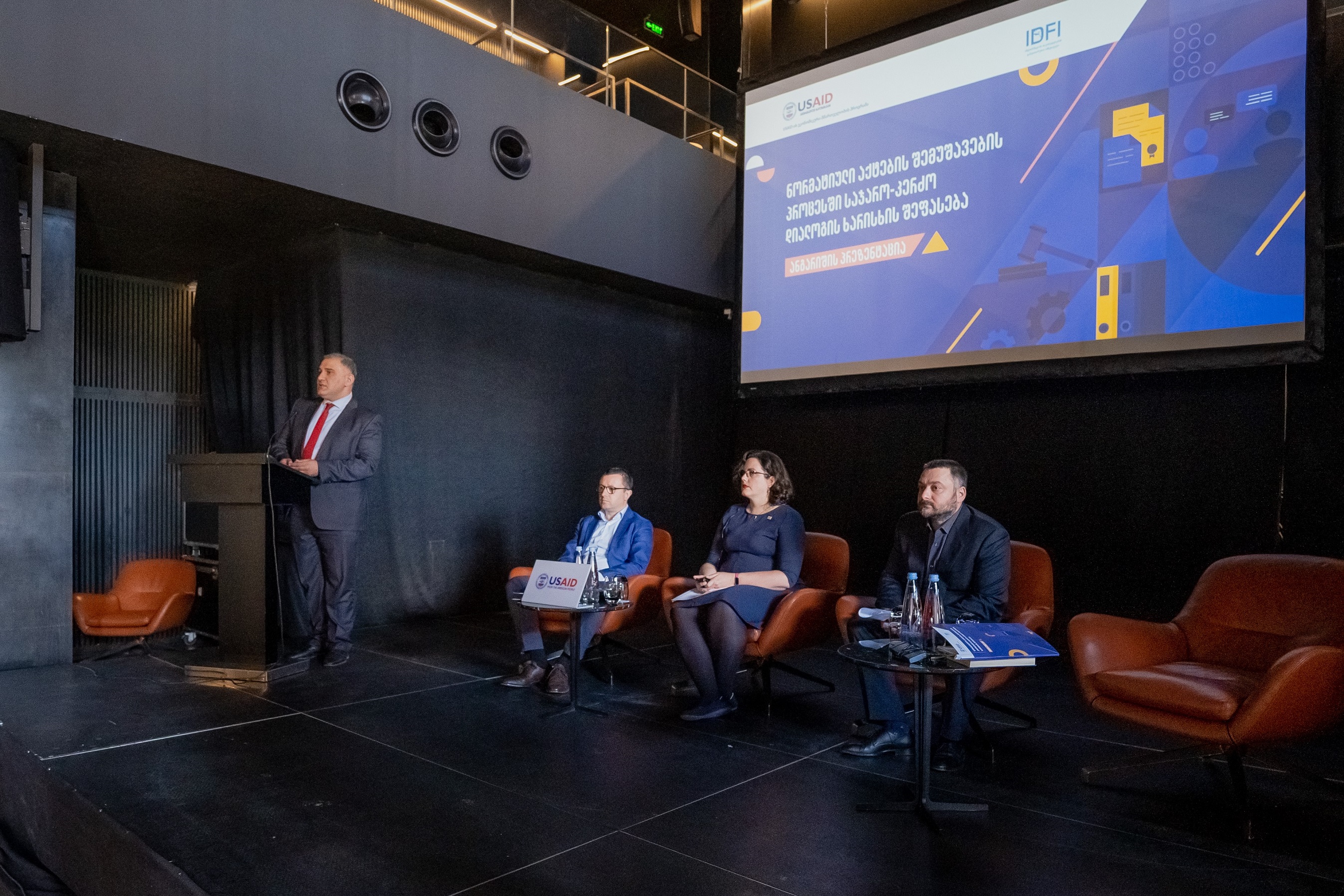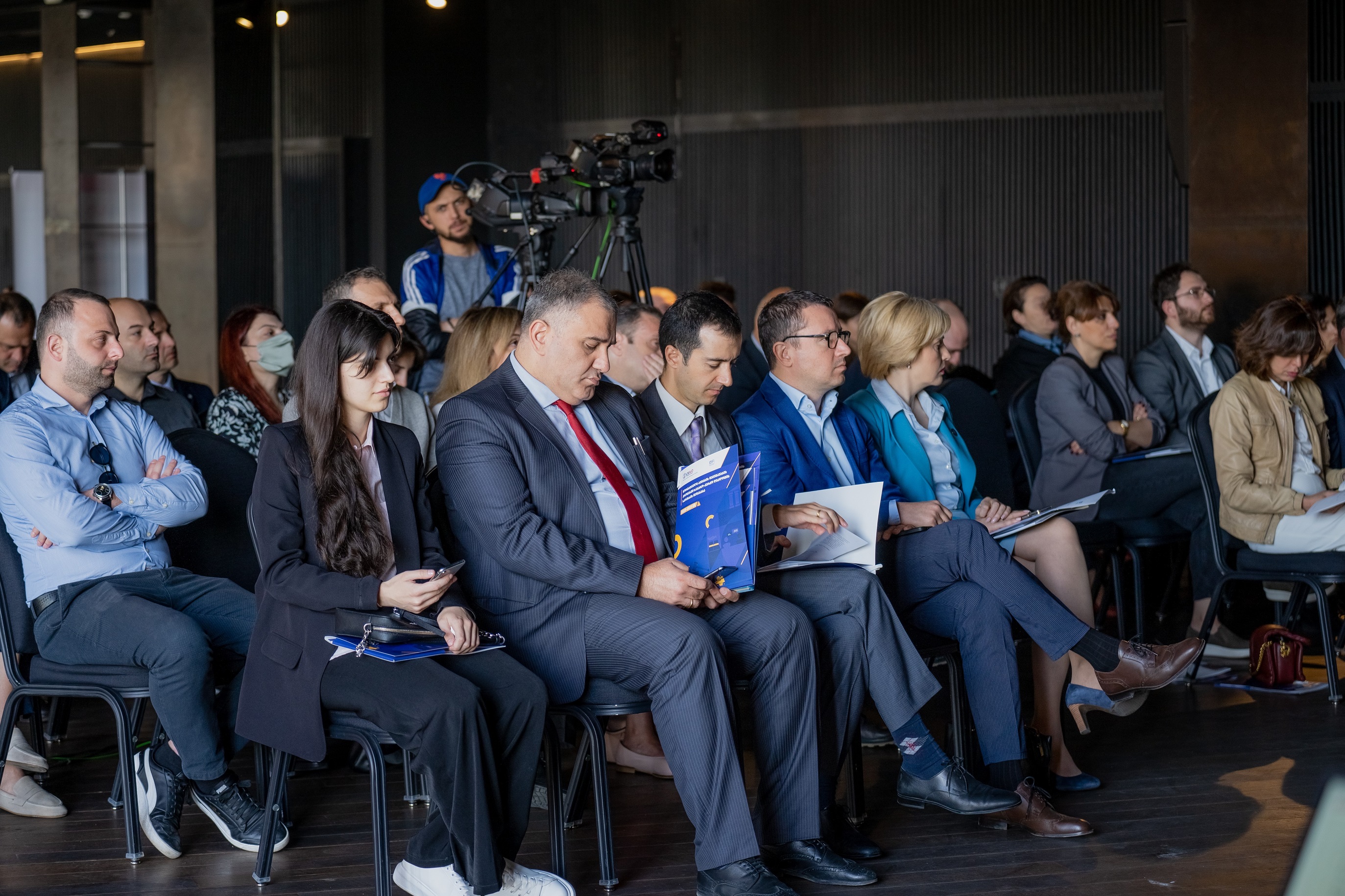


 On 25 May, The Institute for Development of Freedom of Information (IDFI), with the support of the USAID Economic Governance Program, held a presentation of the report Assessing the Quality of Public-Private Dialogue in the Drafting Normative Acts - 2020-2021.
On 25 May, The Institute for Development of Freedom of Information (IDFI), with the support of the USAID Economic Governance Program, held a presentation of the report Assessing the Quality of Public-Private Dialogue in the Drafting Normative Acts - 2020-2021.
Mikheil Sarjveladze, Chair of Human Rights and Civil Integration Committee, Parliament of Georgia, Irakli Nadareishvili, Deputy Minister of Economy and Sustainable Development of Georgia, and Marika Olson, Head of USAID/Georgia Economic Growth Office, welcomed participants of the event with opening remarks.
Event was moderated by Giorgi Kldiashvili, Executive Director of the Institute for Development of Freedom of Information and Natalia Beruashvili, Chief of Party, the USAID Economic Governance Program.
“The USAID-supported Public-Private Dialogue Quality Assessment Report released today proves importance of tracking and analyzing PPD practices in development of normative acts in key reform areas. PPD platforms are essential part of making sure the voices of all stakeholders are heard and included during the policymaking process.” - noted Natalia Beruashvili.
“Successful cooperation between the public and private sectors is important for the effective implementation of public policy and will contribute to the development of our economy. The openness of the government and civil society’s awareness are important preconditions for assessing and overcoming existing challenges.” - said Giorgi Kldiashvili.
 In the framework of the research, the Institute for Development of Freedom of Information examined 18 normative acts. Among these,the quality of public-private dialogue during the preparation of the normative act was assessed as high in the case of 7, in the case of 10 normative acts it was evaluated as medium, and in 1 case - as low.
In the framework of the research, the Institute for Development of Freedom of Information examined 18 normative acts. Among these,the quality of public-private dialogue during the preparation of the normative act was assessed as high in the case of 7, in the case of 10 normative acts it was evaluated as medium, and in 1 case - as low.
The Law of Georgia on Entrepreneurs and the Decree of the President of the National Bank of Georgia on the Approval of the Rules of Conduct of Foreign Exchange Market Participants earned the highest quality assessment.
The assessment revealed that
- The majority of public institutions public working versions of the normative acts on their websites.
- Almost all public agencies held at least one public discussion.
- For the most part, public discussions were not held in the regions.
In the interviews conducted within the framework of the study, the private sector positively assessed the openness of the public sector. In some cases, however, the quality of the extent to which recommendations were taken into account was assessed negatively.
 Taking into account the research finding, in order to improve the quality of public-private dialogue, it is necessary to:
Taking into account the research finding, in order to improve the quality of public-private dialogue, it is necessary to:
- Initiate dialogue at the policy-planning stage.
- Prepare Regulatory Impact Assessment.
- Proactively publish information.
- Hold public discussions in the regions.
- Raise awareness regarding the importance of dialogue.
During the conference, a panel discussion was held on the role of public-private dialogue in Economic policymaking: challenges and opportunities. The participants of the panel discussion were Eka Sepashvili, the First Deputy Chairperson, Sector Economy, and Economic Policy Committee; Papuna Lezhava, the Member of the Board of the National Bank of Georgia, Vice-Governor; Giorgi Cherkezishvili, the Secretary of Investors’ Council; and Levan Vepkhvadze, Executive Director of Business Association of Georgia.
In the future, through active collaboration with the public and private sectors, the Institute for Development of Freedom of Information, with the support of USAID's Economic Governance Program, plans to facilitate the improvement of the quality of public-private dialogue and raise public awareness on its importance.
Read the report here.